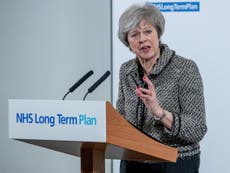The government’s 10-year NHS plan is welcome – but a shift in public opinion is needed if we are to save it
The truth is that if those in the NHS did not care about the service, then the sporadic crises the NHS suffers from would be far more frequent and acute
It would be perverse indeed to deride a government pledge to provide certainty in funding, clinical priorities and administration for the National Health Service into the 2030s. A half a million lives saved through preventing diseases, such as strokes, heart problems and cancer cannot be dismissed as mere spin. Theresa May has announced a serious piece of policy, and it deserves serious attention.
Long-term stability is, after all, what the health think tanks, every political party, every health workers’ union and every royal college has been demanding for many years. Yes, the announcement has been delayed – for reasons that can only be guessed at – but the midwife has been called and the government’s latest policy baby has enjoyed a healthy birth. Although the plan only applies to NHS England, as a devolved sphere of policy, similar plans will emerge from the administrations in Scotland, Wales and Northern Ireland, matching new funds with new priorities.
There is, indeed, much to welcome in the detail of the NHS 10-year plan. It is encouraging to see important reforms promised, such as the renewed emphasis on mental health; steering the NHS away from being a “National Illness Service” through preventative health initiatives; strengthening community care services and GPs’ facilities; and cancer screening and digitisation. It sensibly links the extra cash to still-greater productivity and value for money. It seeks to push the NHS towards the levels of IT usage routine in, say, finance or retail. This needs to be pursued with some care: extra funds are not always a spur to extra efficiency, whereas a shortage of resources, perversely, can be.
For one of the NHS’s secrets is that those who work in it are often driven to ever greater efficiencies simply because of the shortage of funds that never disappears, because of an ageing population and advances in often costly drugs and treatments. In order to put patients first, order clinical priorities fairly and make the best of what is there, nurses, GPs, surgeons, consultants and management alike are in a perpetual search for economies and efficiencies. They do this, and put in the hours, with no particular encouragement or thanks from MPs or the population as a whole. Like much else that goes on in the NHS, excellence is pursued quietly and with superb devotion.
Stories in the media about “waste” give a noxiously distorted image of reality. Often as not, they have an anti-NHS agenda of their own, which is to marginalise it as a means-tested “safety net” service only for the very poor, tantamount to charity. Like the coverage of Brexit, elements of the press have much to answer for in their pernicious coverage. The truth is that if those in the NHS did not care about the service, then the sporadic crises the NHS suffers from would be far more frequent and acute.
So the key to getting the best for the NHS is to balance greater funding with improved productivity, which does not necessarily mean the setting for ever-more exacting targets. These were devised during New Labour’s second term of office, when Gordon Brown and Tony Blair sought to carry a sceptical public with them while they raised taxes (technically national insurance) to “repair” the NHS.
However, too often these targets, and their various successors, for waiting times and lists were crudely designed, or counterproductive. In the nature of things, hard-pressed clinicians have found ways to massage their statistics to make them look better, whatever may be happening to the underlying service. This bureaucratic game of cat and mouse has been of limited benefit to patients. The greatest warning from recent history is that the NHS finds it difficult to cope with unexpectedly large transfusions of money; and its record as an IT pioneer leaves a great deal to be desired. This is one area where extreme caution and scrutiny is essential: last time digitisation was attempted, some £12bn was wasted before it was called off in 2011. Much the same goes for any new PFI schemes, which have enjoyed a mixed financial record, to put it mildly.
The other weaknesses in the NHS 10-year plan are as obvious as a broken leg set in plaster of Paris. That £20bn per year of extra funding, for example, is predicated on assumptions about economic growth and public spending and borrowing that may prove impossible to achieve. Here, as always, Brexit intervenes. If the UK does leave the EU, then economic growth will slow still further from its already sluggish current rates, as exports, investment and productivity all suffer, and tax revenues with them. Put at its simplest, the funds now being promised to the NHS may only be found at the cost of deep cuts in other public services – at a political cost that may prove to be unacceptable.
The second principal weakness in the 10-year plan has also been rightly raised by almost everyone concerned – a shortage of staff. This was the situation even before Brexit started to push EU nationals out of the UK through a combination of shifting exchange rates and a general worry about their future in Britain. Even with impressive improvements in productivity, health and social care tend to be labour-intensive activities. A robot that can restrain a dementia patient attempting to break out of a home or can administer a bed bath has not yet been invented. The net effect of Brexit may actually be to simply bid up wages for NHS staff to attract them from other parts of the economy. That may be good news for underpaid, hard-working professionals – but it is also means less money for new scanners, hospital wings, modern GP clinics, drugs and much else.
The founder of the NHS, Aneurin Bevan, was famous for his remark that “the language of priorities is the religion of socialism”. He might as well have said the language of priorities is the religion of the NHS, given that it is the nearest thing to a god the British now have to worship. This time, the priorities for the next decade have been sensitively and intelligently set; but they will only be fulfilled if the tax-paying public agrees to put funding public services ahead of tax cuts and private consumption for a whole decade, a period when post-Brexit real wages will remain badly depressed. This 10-year long course of medicine will be difficult to complete.







Join our commenting forum
Join thought-provoking conversations, follow other Independent readers and see their replies